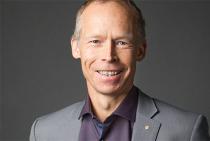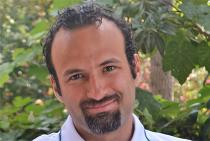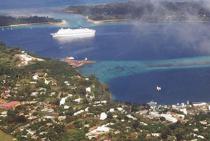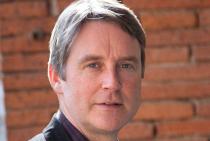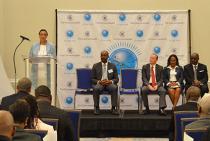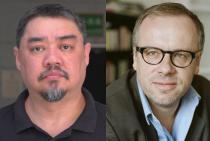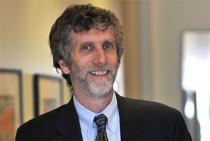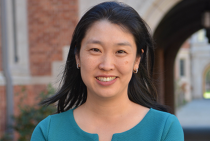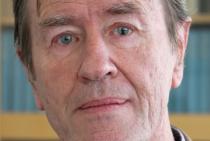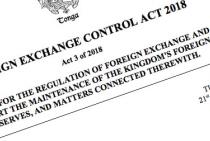The peace that was once an entitlement enjoyed by Tonga's residents and an attraction for visiting tourists has been stolen by the inconsiderate few, with the introduction of amplified sound systems with thumping bass. The Public Health Act does not permit any excessive noise, causing discomfort anytime, yet these laws are not enforced. - Shane Egan.
You are here
Results for Opinion
Wednesday 26 June 2019
Kanokupolu, Tongatapu
Tuesday 25 June 2019
Potsdam, Germany
The leaders of the G20 countries head to Osaka this week for their annual summit. United Nations Secretary-General António Guterres will address them before traveling to Abu Dhabi to finalize the arrangements for September’s UN Climate Action Summit. These meetings should set the world on course for the fastest economic transition in history. Yet both are likely to deliver incremental action, at best. By Johan Rockström
Tuesday 25 June 2019
Manchester, United Kingdom
Although the idea of the Internet “making the world a better place” is often ridiculed today, it’s easy to forget that this decade began amid optimism that new technologies would connect people, broaden access to information, and generate abundant new economic opportunities. Today, however, governments around the world are considering policies that would undermine the Internet’s openness and global reach. By Shamel Azmeh
Saturday 15 June 2019
Nuku'alofa, Tonga
It appears that while we don’t yet know the full version of the government’s economic vision for Tonga, we know at least one thing…it is not welcoming to outside ideas and investment. Investors will ask: why should I take the risk caused by Tonga’s Foreign Exchange Act and experience the currently obvious roadblocks to doing business in Tonga? Maybe somewhere else will be better? - Dean Bishoprick.
Wednesday 12 June 2019
Melbourne, Australia
There is no such thing as an own goal in rugby, but Rugby Australia, the game’s governing body in Australia, has done its very best to score one by terminating the contract of Israel Folau. In doing so, it has lost the services of a star fullback who has played 73 tests for Australia. ... But once we allow, as a ground for restricting someone’s freedom of speech or action, the claim that someone else has been offended by it, freedom is in grave danger of disappearing entirely. By Peter Singer
Tuesday 11 June 2019
Berlin, Germany
After three decades of moving toward a single global market governed by the rules of the World Trade Organization, the international order has undergone a fundamental change. The United States and China are locked in a tariff war that at first seemed to be about the bilateral trade balance, but has turned out to be about much more. Until recently, one could find hope in the fact that, despite frequent exchanges of threats, the two countries were negotiating. Not anymore. - By Joschka Fischer.
Monday 10 June 2019
Bangkok, Thailand
After decades as an unconsidered backwater, the South Pacific Islands have become a strategic frontline in a multi-nation contest for power and influence in Greater Asia. A report this week by the British-based global risk assessment company, Oxford Analytica, says China has four objectives in extending its reach into the South Pacific. By Jonathan Manthorpe.
Thursday 6 June 2019
Trento, Italy
In short, the big religion story in the last century is not one of ideological struggle between Christianity and Islam, with Islam winning. It is a story of growing corporatization, with local and folk religions everywhere being gradually but inexorably replaced by churches and mosques that are affiliated with two of the world’s main religious brands. You may regret it or welcome it, but it has proved unstoppable. By Paul Seabright.
Wednesday 5 June 2019
Commonwealth Secretary-General Patricia Scotland has outlined a framework to help member countries investigate and prosecute corruption offences, which cost the global economy around $2 trillion a year. She was speaking at the fifth annual regional meeting of the Caribbean heads of anti-corruption agencies, hosted in the Cayman Islands from 3-7 June.
Tuesday 4 June 2019
Paris, France
Since the Tiananmen Square massacre 30 years ago, China has achieved extraordinary economic development. Yet, contrary to the expectations of many Western leaders and analysts, the country has not gradually embraced press freedom or respect for civil rights. On the contrary: as a recent Reporters Without Borders (RSF) report shows, China today is actively working to build a repressive “new world media order” – an initiative that poses a clear and present danger to the world’s democracies. By Wu’er Kaixi and Christophe Deloire.
Thursday 30 May 2019
New York, USA
The immune system – an intricate network of cells, tissues, and organs – is the human body’s primary mechanism for staying healthy. Decoding it should be central to our efforts to understand and fight illness, whether non-communicable diseases such as cancer, diabetes, and Alzheimer’s, or infectious ones such as tuberculosis, malaria, and Ebola. By fully leveraging the power of our immune systems, we could find new ways to fight disease everywhere. Artificial intelligence (AI) and machine learning will be the keys to this achievement - because of the vast size and complexity of the human immune system. It is billions of times larger than the human genome. By Wayne Koff.
Monday 27 May 2019
Stockholm, Sweden
Earlier this month, a bleak global assessment of the shocking state of life on Earth made headlines worldwide. According to the report by the Intergovernmental Science-Policy Platform on Biodiversity and Ecosystem Services (IPBES), about 12% of all known animal and plant species are now threatened with extinction. Worse still, humanity is destroying entire habitats, and with them the web of life that supports societies and economies. Unsurprisingly, the findings were greeted with despair. By Ana Paula Aguiar, Odirilwe Selomane, and Pernilla Malmer.
Friday 17 May 2019
Nuku'alofa, Tonga
The proposed changes to the Constitution to take away the King's remaining powers and transfer it to the Prime Minister and his Cabinet is backwards and undemocratic. - 'Ana Tausinga
Tuesday 14 May 2019
Bangkok, Thailand
Having watched popular protests, from the color revolutions in the former Soviet Union to the Arab Spring, challenge their counterparts’ power, the world’s autocrats have been adopting legal measures aimed at incapacitating civic groups, including pro-democracy movements and human-rights NGOs. Among the most sweeping measures are those enabling officials to monitor and punish activists’ online activities. For activists, pushing back against draconian cyber laws and other forms of digital repression will not be easy, not least because it remains uncharted territory. By Janjira Sombatpoonsiri.
Friday 10 May 2019
Brussels, Belgium
Since the massive mobilization effort that preceded the 2009 Conference of the Parties (COP15) in Copenhagen, the world has begun translating words and intentions into real action on climate change. European leadership – from government, civil society, and business – has played a pivotal role in driving progress. Given how much remains to be done, such leadership must continue – and become stronger.
Monday 6 May 2019
2 comments
Nuku'alofa, Tonga
Can Tonga grow its economy? Asked if it was possible I would answer with a resounding Yes! There may be a need for some outside help, but there is an excess of unused talent and a large underutilized work force here that has proven itself in the past. - Dean Bishoprick
Friday 3 May 2019
New Haven, USA
This is a big year for anniversaries in China. On May 4, the People’s Republic will commemorate the centennial of the May Fourth Movement, the student-led protests in front of Beijing’s Tiananmen Gate in 1919 that marked the birth of Chinese nationalism. And then, one month later, on June 4, will come the 30th anniversary of the violent suppression of pro-democracy student protests on the same site. This milestone, by contrast, will not be officially acknowledged, much less commemorated, in China.
Thursday 2 May 2019
Stockholm, Sweden
The problem is staggering, even existential. Global emissions of greenhouse gases – especially carbon dioxide – are rapidly driving up global temperatures, transforming life as we know it. If those temperatures reach 2oC above pre-industrial levels, scientists warn, the results will be catastrophic. An international conference is called, under the auspices of the United Nations. Politicians declare that the world must curb CO2 emissions to avoid exceeding the 2oC threshold. And then nothing substantial happens. By Mats Persson.
Saturday 27 April 2019
New Delhi, India
The Easter Sunday bombings in Sri Lanka rank among the deadliest terrorist attacks in modern history, and underscore the metastasizing scourge of Islamist violence in Asia. Radical Islamic groups, some affiliated with larger extremist networks, have been quietly gaining influence in an arc of countries extending from the Maldivian to the Philippine archipelagos, and the threat they pose can no longer be ignored.
Tuesday 23 April 2019
Nuku'alofa, Tonga
Are you affected by the Foreign Exchange Control Act of 2018? This is a question we should all ask.... Even if this Act was intended to stifle foreign investment in Tonga, why put the severe restrictions on what the residents of Tonga can or cannot do with their money? - Dean Bishoprick



